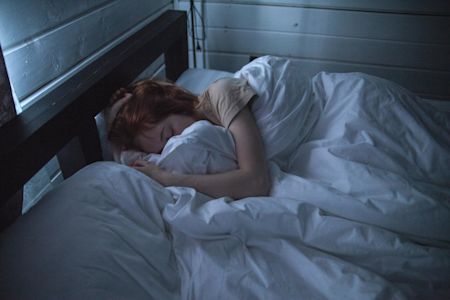The secret to falling asleep fast
If you struggle to fall asleep quickly, try these tips from insomnia expert Kathryn Pinkham.
Get an annual subscription to The Body Coach app for just £69.99 (usually £89.99)

In this article, Kathryn Pinkham, an insomnia expert, shares the best way to handle the day after a bad night’s sleep
Are you tired of being tired? We’ve all been there: tossing and turning all night, waking up feeling groggy and unrested. A poor night’s sleep can feel like a heavy weight on our shoulders, leaving us worrying how we’ll function through the day ahead.
The impact of one bad night can extend beyond just fatigue – it can affect our mood, productivity, and overall wellbeing. But what if I told you that the way we respond to a bad night’s sleep is just as important as the sleep itself?
As an insomnia expert and founder of the Insomnia Clinic, I’ve spent years helping people overcome insomnia with Cognitive Behavioural Therapy for Insomnia (CBT-i). In my experience, understanding and managing our thoughts and behaviours around sleep is key to breaking the cycle of poor sleep.
After a sleepless night, it’s easy to feel frustrated and determined to “make up” for the lost sleep the next night. Unfortunately, this pressure to sleep better often backfires. The more vigilant we are about sleep and the more we try to force it, the harder it becomes to achieve. It helps reframe how we think about sleep, breaking the cycle of pressure to sleep well.
Here are my 5 tips to help you get back on track after a poor night’s sleep.
It’s completely normal to feel frustrated or irritated after a poor night’s sleep. However, instead of dwelling on how you feel, be proactive. Write down your emotions, sit with them, but then consciously decide to move forward. It’s okay to acknowledge the frustration but don’t let it define your day.
Resist the urge to cancel your plans or avoid activities because of a bad night’s sleep. In fact, doing the opposite can help. By continuing with your day and proving to yourself that you can cope (even if you don’t feel your best), you reduce the pressure around sleep, which in turn can help the next night.
After a bad night’s sleep, it may be tempting to go to bed earlier the next night in an effort to catch up. But this can actually make things worse. Why? Think of your sleep like an appetite – it works best when you’re hungry, not stuffed.
When you go to bed too early, your body clock may not have a relationship with falling asleep at that time, even if you feel tired. You then end up lying awake in bed, frustrated.
This creates a cycle of anxiety and can make it even harder to fall asleep the next night. Stick to your usual bedtime or even a later one to build a stronger sleep appetite, even if you're tired.
Instead of focusing on sleep to fix how exhausted you feel, try to find ways to boost your energy naturally. Good nutrition, staying hydrated, getting fresh air, and engaging in light exercise are all effective ways to improve your energy levels – even if you don’t feel like it!
A quick walk with a friend or taking a moment for mindfulness can help re-energise you: sleep is not the only way to feel better. When you shift your focus to other ways to create more energy, it takes the pressure off sleep.
One of the most common thoughts after a bad night’s sleep is the belief that you won’t be able to function or that you’ll never sleep well again. How often have you thought, “I won’t cope tomorrow” or “Being tired is going to ruin my weekend”?
It’s easy to catastrophise when you're feeling sleep-deprived. Make time to challenge these negative thoughts and remind yourself that you’ve coped with poor sleep before.
Spend some time reflecting on past experiences, too. How many times have you functioned the day after a poor night of sleep? What does not coping actually mean? Chances are, you’ve managed better than you thought. Your thoughts play a big role in how you sleep, so by shifting your perspective, you’ll reduce anxiety around the next night’s sleep.
If you track your sleep using a watch or device, it may offer some insights into your sleep patterns, but it doesn’t help you feel better the day after a poor night. In fact, research shows that seeing a poor sleep result first thing in the morning can negatively impact your mood and set the tone for the day. If you're already anxious about poor sleep, I suggest ditching the tracker. After all, you know you slept badly because you experienced it first-hand – there’s no need for a device to confirm it! Plus, many sleep trackers aren’t entirely accurate, which can add to the confusion.
Are you struggling with sleep? Join Kathryn's webinar to learn how to fall asleep easily and stay asleep all night. Click here to get started.